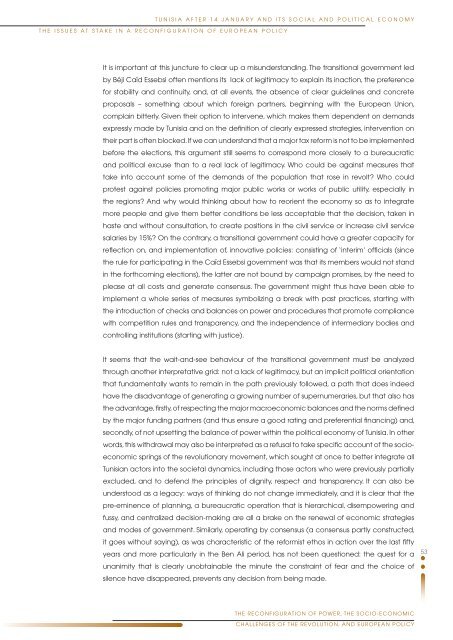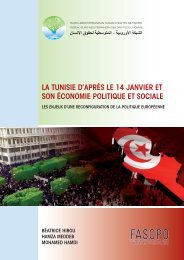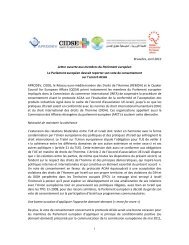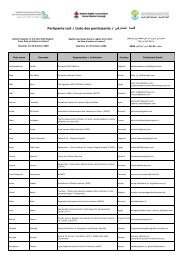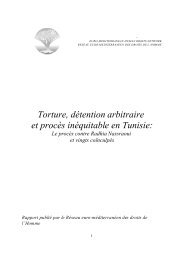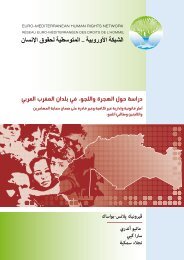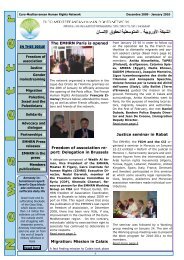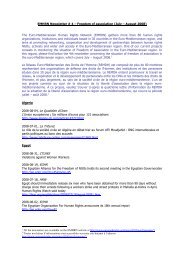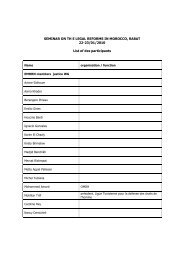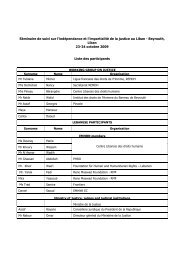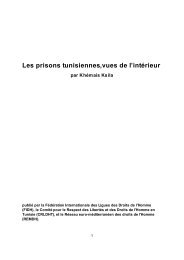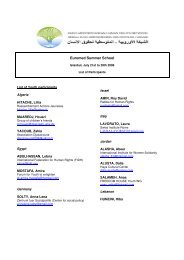tunisia after 14 january and its social and political economy - Refworld
tunisia after 14 january and its social and political economy - Refworld
tunisia after 14 january and its social and political economy - Refworld
You also want an ePaper? Increase the reach of your titles
YUMPU automatically turns print PDFs into web optimized ePapers that Google loves.
T U N I S I A A F T E R 1 4 J A N U A R Y A N D I T S S O C I A L A N D P O L I T I C A L E C O N O M YT H E I S S U E S A T S T A K E I N A R E C O N F I G U R A T I O N O F E U R O P E A N P O L I C YIt is important at this juncture to clear up a misunderst<strong>and</strong>ing. The transitional government ledby Béji Caïd Essebsi often mentions <strong>its</strong> lack of legitimacy to explain <strong>its</strong> inaction, the preferencefor stability <strong>and</strong> continuity, <strong>and</strong>, at all events, the absence of clear guidelines <strong>and</strong> concreteproposals – something about which foreign partners, beginning with the European Union,complain bitterly. Given their option to intervene, which makes them dependent on dem<strong>and</strong>sexpressly made by Tunisia <strong>and</strong> on the definition of clearly expressed strategies, intervention ontheir part is often blocked. If we can underst<strong>and</strong> that a major tax reform is not to be implementedbefore the elections, this argument still seems to correspond more closely to a bureaucratic<strong>and</strong> <strong>political</strong> excuse than to a real lack of legitimacy. Who could be against measures thattake into account some of the dem<strong>and</strong>s of the population that rose in revolt? Who couldprotest against policies promoting major public works or works of public utility, especially inthe regions? And why would thinking about how to reorient the <strong>economy</strong> so as to integratemore people <strong>and</strong> give them better conditions be less acceptable that the decision, taken inhaste <strong>and</strong> without consultation, to create positions in the civil service or increase civil servicesalaries by 15%? On the contrary, a transitional government could have a greater capacity forreflection on, <strong>and</strong> implementation of, innovative policies: consisting of ‘interim’ officials (sincethe rule for participating in the Caïd Essebsi government was that <strong>its</strong> members would not st<strong>and</strong>in the forthcoming elections), the latter are not bound by campaign promises, by the need toplease at all costs <strong>and</strong> generate consensus. The government might thus have been able toimplement a whole series of measures symbolizing a break with past practices, starting withthe introduction of checks <strong>and</strong> balances on power <strong>and</strong> procedures that promote compliancewith competition rules <strong>and</strong> transparency, <strong>and</strong> the independence of intermediary bodies <strong>and</strong>controlling institutions (starting with justice).It seems that the wait-<strong>and</strong>-see behaviour of the transitional government must be analyzedthrough another interpretative grid: not a lack of legitimacy, but an implicit <strong>political</strong> orientationthat fundamentally wants to remain in the path previously followed, a path that does indeedhave the disadvantage of generating a growing number of supernumeraries, but that also hasthe advantage, firstly, of respecting the major macroeconomic balances <strong>and</strong> the norms definedby the major funding partners (<strong>and</strong> thus ensure a good rating <strong>and</strong> preferential financing) <strong>and</strong>,secondly, of not upsetting the balance of power within the <strong>political</strong> <strong>economy</strong> of Tunisia. In otherwords, this withdrawal may also be interpreted as a refusal to take specific account of the socioeconomicsprings of the revolutionary movement, which sought at once to better integrate allTunisian actors into the societal dynamics, including those actors who were previously partiallyexcluded, <strong>and</strong> to defend the principles of dignity, respect <strong>and</strong> transparency. It can also beunderstood as a legacy: ways of thinking do not change immediately, <strong>and</strong> it is clear that thepre-eminence of planning, a bureaucratic operation that is hierarchical, disempowering <strong>and</strong>fussy, <strong>and</strong> centralized decision-making are all a brake on the renewal of economic strategies<strong>and</strong> modes of government. Similarly, operating by consensus (a consensus partly constructed,it goes without saying), as was characteristic of the reformist ethos in action over the last fiftyyears <strong>and</strong> more particularly in the Ben Ali period, has not been questioned: the quest for aunanimity that is clearly unobtainable the minute the constraint of fear <strong>and</strong> the choice ofsilence have disappeared, prevents any decision from being made.53The reconfiguration of power, the socio-economicchallenges of the revolution, <strong>and</strong> European policy


